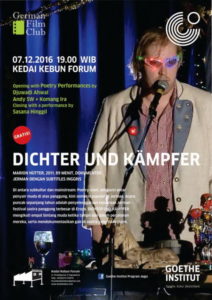

German Film Club
Wednesday, 7 December 2016, 7.00 pm
Auditorium, Kedai Kebun Forum
Jl. Tirtodipuran 3, Yogyakarta
Open for public and free
presents
Dichter und Kämpfer
Director: Marion Hütter, 2011, dokumentary, 89 min., Deutsch with English subtitles
Opened with a poetry reading by [ Djuwadi Ahwal, Andy SW & Komang Ira ]
Appearance closure by [ Sasana Hinggil ]
SYNOPSIS
Between subculture and mainstream: poetry slams, the on-stage, live contest between young poets, are becoming increasingly popular in Germany. The German championships represent the highlight of the year – it’s the biggest festival for on-stage literature in Europe. RHYMERS AND RIVALS accompanies four young stars on the scene during their performances and tours, and documents unusual literary passions.
The morning after, they are talking about the success of the previous evening. They’re still very tired, but also full of enthusiasm: poetry slammers Julius Fischer, Philipp “Scharri” Scharrenberg, Sebastian23 and Theresa Hahl. The three young men have all won the title of German champion once before, while the young woman is on her way from being a newcomer to a new star on the scene. The film accompanies them for a longer period of time, showing their different talents and ideals and looking into their individual ideas of career and profession. This involves snapshots, rather than chronological events; admittedly, this doesn’t help to create a clear and orderly structure. But it does create the impression that the film scenes came about more spontaneously than they actually did.
A competition final: the order of candidates is announced. Sebastian23, winner of the 2008 championships and organiser of the 2010 competition, is the first to go on stage – a thankless task, as the judges always leave room for improvement in their first assessments. He looks at it nonchalantly: “I don’t take the idea of competition so seriously!” The second candidate is Julius Fischer, who identifies more with the subculture and sees a danger of commercialisation and conformity in the growing popularity of poetry slams. Theresa Hahl, the seemingly shy newcomer, is third; she seems to constantly be surprised about her own success and the fact that she even gets paid for her performances. When Philipp Scharrenberg, the fourth candidate, goes up on stage, the camera follows for the first time: his performances seem very spontaneous, and yet this is the result of careful preparation; the ironic end rhymes and tempo variations, with which he makes a complete German hypochondria the subject of irony, manoeuvring somewhere between cabaret, politics, hip-hop and lyricism, are proof of this. Back home, he expresses happiness about his 2009 title, but remains sceptical: poetry slams have nothing to do with money in his opinion and can’t be regarded as a profession, and yet he sees them as a possibility of “expressing his creative streak”. He still seems very youthful and surprises viewers when he states that he didn’t start performing until he was 30.
Julius Fischer and his partner Christian Meyer (“Hornisschen Orchestra”) present their song “Bahndammbrand”, first at the playground, then on stage. The song, which comes close to being recitative, has as much of an affinity with rap as it does with the sound poetry of Ernst Jandl: language becomes a game, with elements encompassing lyricism, comedy and loud fun.
At a workshop, Sebastian23 explains the rules to his audience: the lyrics need to have been written by themselves. Using props on stage is a no-go, but beatboxing is permitted. Theresa Hahl walks along a winter canal and explains: “To write, your mind needs to be clear and stimulated”– a barely disguised rejection of drugs as an accelerator of fantasy. “I’m not really a poet”, she admits, “I’m more of an amateur artist!” And she adds an example: “I’m the only one who goes to Africa when walking over a zebra crossing!” The film cuts between Theresa on a street and on the stage, her text can be heard running over both filming locations, uninterrupted – evidence of how precisely the pieces are planned and learned by heart, otherwise a montage of this kind would not have been possible.
Philipp Scharrenberg performs at the theatre “Unterhaus” in Mainz; he is not a purist, as he is clearly on his way to making a career as a cabaret artist besides being a poetry slammer. Stubborn purism is clearly a very alien concept to the slammers. In that sense, the film’s German title is a little misleading: “Kämpfer”, literally translated as “fighters”, suggests militarism and an ideology followed at least subliminally, but these young people are more linguistic artists and dreamers, who keep a distance from the militant rappers and are looking for their own, more lyrical tone, even if this may sound ironic at times. RHYMERS AND RIVALS was shown at the 2012 Berlin International Festival as part of the “Perspektive Deutsches Kino” section and “grants”, according to the 3sat kulturzeit magazine show, “a profound insight into a genre that was only accessible to insiders up until now. A refreshingly different, comically authentic film”.
Marion Hütter born in 1968, she studied German Literature, Politics and Economics in Berlin and graduated from the Berlin School of Journalism. Marion Hütter has been working as a journalist and writer for the last 20 years in Berlin and has made over 50 national and international TV reportages and current affairs pieces for the public broadcaster Deutsche Welle. RHYMERS AND RIVALS is her first feature-length documentary.
More info please contact Uniph 0857-2580-9139